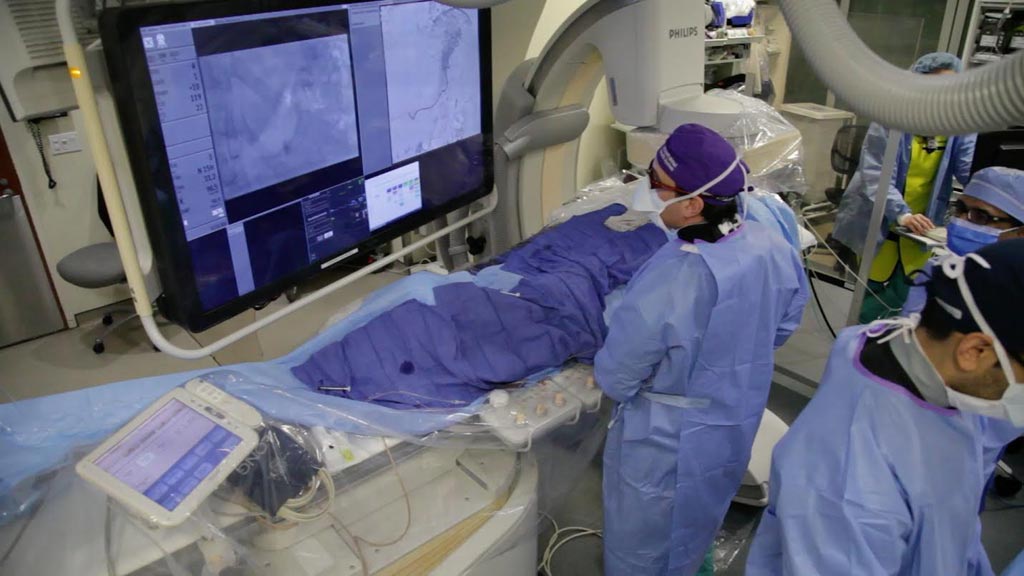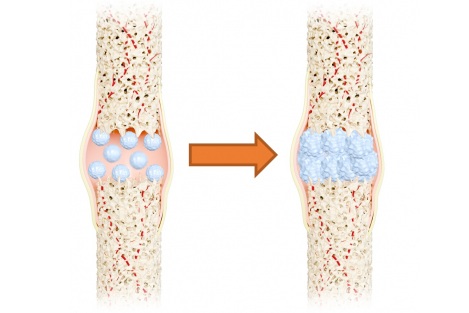Bariatric Fundus Embolization Viable for Severely Obese Patients
|
By HospiMedica International staff writers Posted on 17 Apr 2019 |

Image: Dr. Aaron Fischman performing a bariatric embolization procedure (Photo courtesy of Mount Sinai Hospital).
Transarterial embolization of the gastric fundus in severely obese adults can suppress appetite and induce weight loss for up to 12 months, claims a new study.
Researchers at Johns Hopkins University (JHU; Baltimore, MD, USA), Mount Sinai Hospital (New York, NY, USA), and other institutions conducted a prospective study that recruited 20 severely obese adults (16 women; mean age 44 years) with a mean body mass index (BMI) of 45 kg/m2 to evaluate the safety and efficacy of bariatric embolization, an image-guided procedure that aims to induce metabolic changes by targeting the endocrine functions of the gastric fundus, which play a role in stimulating appetite.
Bariatric embolization was performed successfully in all participants, with no major adverse events. The mean excess weight loss was 8.2% at one month, 11.5% at three months, 12.8% at six months, and 11.5% at 12 months. Hunger or appetite decreased for four weeks after embolization, increasing again thereafter, but without reaching pre-embolization levels. Study participants also showed evidence of metabolic change, with decreases in hemoglobin A1c and total cholesterol (independent of weight loss), and concomitant increase in high-density lipoprotein (HDL) levels. The study was published on April 2, 2019, in Radiology.
“Weight loss of 5-10% has been found to reduce risks of cardiovascular disease and diabetes, including reduced hemoglobin A1c, increased HDL, reduced triglycerides, reduced blood pressure, and reduced need for diabetes and antihypertensive medications,” concluded lead author Clifford Weiss, MD, of JHU, and colleagues. “The changes in hemoglobin A1c, and the fact that they occurred independent of weight loss, may indicate that bariatric embolization alters the metabolic profile in ways similar to bariatric surgery, but to a lesser degree.”
Transarterial bariatric embolization of the gastric fundus delivers embolic microspheres into the gastric arteries to induce localized ischemia and modify appetite hormones, leading to weight reduction; early clinical trials have produced promising short-term results in animal models.
Related Links:
Johns Hopkins University
Mount Sinai Hospital
Researchers at Johns Hopkins University (JHU; Baltimore, MD, USA), Mount Sinai Hospital (New York, NY, USA), and other institutions conducted a prospective study that recruited 20 severely obese adults (16 women; mean age 44 years) with a mean body mass index (BMI) of 45 kg/m2 to evaluate the safety and efficacy of bariatric embolization, an image-guided procedure that aims to induce metabolic changes by targeting the endocrine functions of the gastric fundus, which play a role in stimulating appetite.
Bariatric embolization was performed successfully in all participants, with no major adverse events. The mean excess weight loss was 8.2% at one month, 11.5% at three months, 12.8% at six months, and 11.5% at 12 months. Hunger or appetite decreased for four weeks after embolization, increasing again thereafter, but without reaching pre-embolization levels. Study participants also showed evidence of metabolic change, with decreases in hemoglobin A1c and total cholesterol (independent of weight loss), and concomitant increase in high-density lipoprotein (HDL) levels. The study was published on April 2, 2019, in Radiology.
“Weight loss of 5-10% has been found to reduce risks of cardiovascular disease and diabetes, including reduced hemoglobin A1c, increased HDL, reduced triglycerides, reduced blood pressure, and reduced need for diabetes and antihypertensive medications,” concluded lead author Clifford Weiss, MD, of JHU, and colleagues. “The changes in hemoglobin A1c, and the fact that they occurred independent of weight loss, may indicate that bariatric embolization alters the metabolic profile in ways similar to bariatric surgery, but to a lesser degree.”
Transarterial bariatric embolization of the gastric fundus delivers embolic microspheres into the gastric arteries to induce localized ischemia and modify appetite hormones, leading to weight reduction; early clinical trials have produced promising short-term results in animal models.
Related Links:
Johns Hopkins University
Mount Sinai Hospital
Latest Critical Care News
- Origami Robots to Deliver Medicine Less Invasively and More Effectively
- Improved Cough-Detection Technology Aids Health Monitoring
- AI Identifies Children in ER Likely to Develop Sepsis Within 48 Hours
- New Radiofrequency Therapy Slows Glioblastoma Growth
- Battery-Free Wireless Multi-Sensing Platform Revolutionizes Pressure Injury Detection
- Multimodal AI to Revolutionize Cardiovascular Disease Diagnosis and Treatment
- AI System Reveals Hidden Diagnostic Patterns in Electronic Health Records
- Highly Sensitive On-Skin Sensing Monitor Detects Vitamin B6 and Glucose in Sweat
- Artificial Intelligence Revolutionizing Pediatric Anesthesia Management
- New Device Detects Tuberculosis DNA Directly in Exhaled Air
- New Menstrual Cup Could Detect Infections and Improve Diagnostics
- Engineered “Natural Killer” Cells Could Help Fight Cancer
- Faster Lymph Flow Predicts Better Response to Diuretics in Acute Heart Failure
- New Global Recommendations Aim to End Deaths from Postpartum Hemorrhage
- 'Flat-Line ECG' Indicates Poor Outcomes for Out-Of-Hospital Cardiac Arrest
- New Guidance to Improve Diagnosis and Management of Heart Failure During Pregnancy and Postpartum
Channels
Surgical Techniques
view channel
Novel Glue Prevents Complications After Breast Cancer Surgery
Seroma and prolonged lymphorrhea are among the most common complications following axillary lymphadenectomy in breast cancer patients. These postoperative issues can delay recovery and postpone the start... Read more
Breakthrough Brain Implant Enables Safer and More Precise Drug Delivery
Delivering medication directly to specific regions of the brain has long been a major challenge in treating neurological disorders. Current implants and infusion systems typically reach only one or two... Read morePatient Care
view channel
Revolutionary Automatic IV-Line Flushing Device to Enhance Infusion Care
More than 80% of in-hospital patients receive intravenous (IV) therapy. Every dose of IV medicine delivered in a small volume (<250 mL) infusion bag should be followed by subsequent flushing to ensure... Read more
VR Training Tool Combats Contamination of Portable Medical Equipment
Healthcare-associated infections (HAIs) impact one in every 31 patients, cause nearly 100,000 deaths each year, and cost USD 28.4 billion in direct medical expenses. Notably, up to 75% of these infections... Read more
Portable Biosensor Platform to Reduce Hospital-Acquired Infections
Approximately 4 million patients in the European Union acquire healthcare-associated infections (HAIs) or nosocomial infections each year, with around 37,000 deaths directly resulting from these infections,... Read moreFirst-Of-Its-Kind Portable Germicidal Light Technology Disinfects High-Touch Clinical Surfaces in Seconds
Reducing healthcare-acquired infections (HAIs) remains a pressing issue within global healthcare systems. In the United States alone, 1.7 million patients contract HAIs annually, leading to approximately... Read moreHealth IT
view channel
Printable Molecule-Selective Nanoparticles Enable Mass Production of Wearable Biosensors
The future of medicine is likely to focus on the personalization of healthcare—understanding exactly what an individual requires and delivering the appropriate combination of nutrients, metabolites, and... Read moreBusiness
view channel
Philips and Masimo Partner to Advance Patient Monitoring Measurement Technologies
Royal Philips (Amsterdam, Netherlands) and Masimo (Irvine, California, USA) have renewed their multi-year strategic collaboration, combining Philips’ expertise in patient monitoring with Masimo’s noninvasive... Read more
B. Braun Acquires Digital Microsurgery Company True Digital Surgery
The high-end microsurgery market in neurosurgery, spine, and ENT is undergoing a significant transformation. Traditional analog microscopes are giving way to digital exoscopes, which provide improved visualization,... Read more
CMEF 2025 to Promote Holistic and High-Quality Development of Medical and Health Industry
The 92nd China International Medical Equipment Fair (CMEF 2025) Autumn Exhibition is scheduled to be held from September 26 to 29 at the China Import and Export Fair Complex (Canton Fair Complex) in Guangzhou.... Read more














